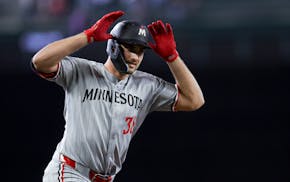In terms of picking up points in the standings, you'd have to say that Minnesota United has their problems solved. After a summer stretch in which the Loons lost eight of 11 games last year, Minnesota has now lost only three times in their past 19 regular season games.
As the Loons take on Vancouver on Sunday, defending their current eight-game unbeaten run, they are trying to solve a new problem: how to get all three points for a win, instead of settling for only one for a draw.
The Loons' defensive setup, in which they defend with a back five and focus on taking away the middle of the field, has given them a very solid base. Over that 19-game period, they are giving up less than one goal per game and have 10 shutouts.
But in the past two weeks, Toronto and FC Dallas have figured out how to turn the tables on the Loons, simply by giving them a taste of their own defensive medicine.
Facing two teams that focused on neutralizing the Loons' counterattacking game, Minnesota struggled to create much in the way of offense. According to the shot data from FBRef.com, over the past two games, the Loons haven't taken a single shot with a better than 26% chance of turning out to be a goal. Even when you add up all the percentages, they didn't manage to total more than 1.0 expected goals in either game.
Coach Eric Ramsay has identified the Loons' area for improvement: using the width of the field. It makes logical sense. If teams take away the Loons' ability to get behind the defense, and take away the middle of the field, all that's left to attack is from the wide areas.
"We want to make sure that we have enough consecutive passes, at more points in the game, to position our wing backs where we want them," Ramsay said. "I think anyone who has watched us over the course of the season has seen us tread that line very finely, as to whether we're attacking too quickly.
"Meaning we're just not connected enough as a team, we haven't got Bongi [Hlongwane] and Joe [Rosales] typically where we want them, in really attacking and threatening positions."
For Ramsay, it's all about getting players into the positions they want them, and letting them create — to be "unpredictable," in his words, rather than repeating the same offensive patterns.
"We want players to have liberty and freedom," he said. "I don't want us to be a team that the opposition can prepare for in real detail because we're going to try to execute pattern X, Y, or Z repeatedly."
As the Loons try to add that offensive element to their game, though, we will see something else from them that perhaps we haven't seen very often: a bunch of players, out of position, trying to scramble back in transition to stop an opposition counterattack.
It's a different task to defend while sprinting 70 yards back to your own penalty area, and in talking to several players and coaches about the most important factors in playing good transition defense, they all landed on the same theme.
Everybody's got to be willing to run.
"You've got to give them their flowers when they make those runs back," goalkeeper Dayne St. Clair said. "They're definitely not easy, and they definitely want to be running the other way, but I think that's the stuff that doesn't necessarily show on the stat sheet — but it's something that means a lot to the team."
Wil Trapp, in true veteran mode, also mentioned the dark arts of committing a small foul in the other team's end of the field to stop a potential counterattack. "Little things that stop the play there, prevent things from turning into a track meet," he said.
Figuring out how to do those things is the next step in Minnesota's development as a team. The Loons have proven they can defend and counter effectively. Going from good to great will mean finding a second speed to go with that first one.
.
Loons vs. Vancouver
2 p.m., Sunday at Allianz Field
TV; radio: MLS Season Pass on Apple TV; 1500 AM, Sirius XM 157
Vancouver (6-1-2, 20 points) is the class of MLS so far this season. The Whitecaps lead the overall standings and are coming off a 2-0 win over Inter Miami in the Concacaf Champions Cup semifinals on Thursday, one of the biggest wins in team history. With the second leg of that semifinal coming up next Wednesday, though, it remains to be seen how the 'Caps will approach a road game in Minnesota. A win for the Loons (4-1-4, 16 points) would prove they deserve to be in the running at the top of the league this year.
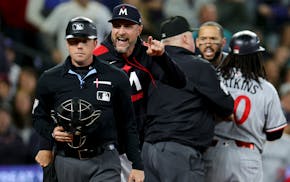
Twins' Correa ejected from on-deck circle, and he's not really sure why
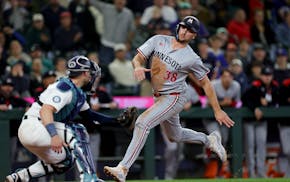
Twins' inability to score in extra innings costly in wild loss at Seattle
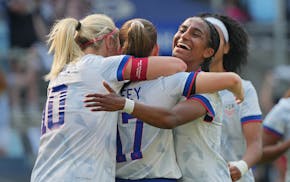
USWNT shuts out China 3-0 at Allianz Field
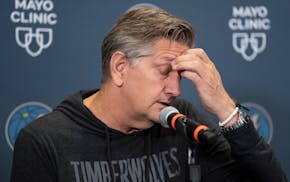
Analysis: The Wolves' offseason, broken down for easy consumption of a complicated topic
